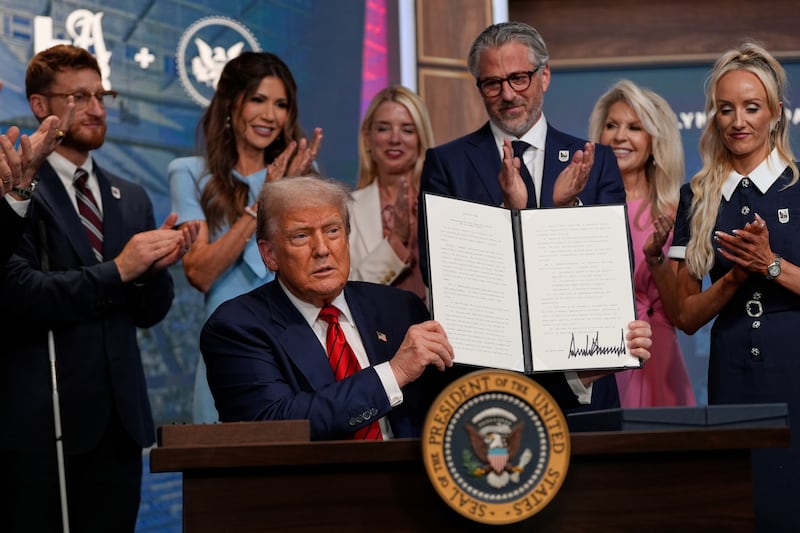President Donald Trump signed an executive order Tuesday creating a White House task force on the 2028 Summer Games in Los Angeles, calling it a “major step” to ensure the safety and success of the event.
“It’s going to be amazing,” the president said at a ceremony that included Vice President J.D. Vance and a number of cabinet members and administration officials, as well as Casey Wasserman, chairman of the organizing committee known as LA28.
The order mobilizes the entire federal government, Trump said.
“America is a nation of champions and in July 2028, we’ll show the world what America does best and that’s winning. We’re winning like we’ve never won before,” he said, echoing one of his campaign slogans before calling the U.S. “the hottest country anywhere in the world.”
According to a White House fact sheet, the “task force will coordinate with Federal, State, and local partners to manage security, transportation, and entry/exit processes” and also “will streamline visa processing and credentialing for foreign athletes, coaches, officials, and media.”
Wasserman thanked the president for his “truly extraordinary” support. Los Angeles was awarded what will be its third Olympics by the International Olympic Committee during Trump’s first term, in 2017.
“You leaned into this process back then, and you’ve been supportive and helpful every step of the way. We wouldn’t be here without you,” Wasserman said, pledging to “deliver the largest, and yes, greatest Games for our nation ever.”
The leader of the private nonprofit organizing committee presented the president with three original medals from the 1984 Summer Games in Los Angeles, presided over by then President Ronald Reagan.
Bringing back Los Angeles
The executive order comes as new questions are being raised about who will pay for police, fire, sanitation and other city services during LA’s Olympics, despite a $1 billion appropriation in the president’s massive tax and spending cut bill signed into law on July 4.
The federal funding for the 2028 Summer Games in the bill is designated “for security, planning, and other costs related to the 2028 Olympics,” but there have been no specifics about how it will be allocated.
There has been plenty of friction between the Trump administration and Democratic officials in California, including over how Bass and other officials handled protests against federal immigration raids where the president deployed National Guard troops.
Trump said Tuesday the administration will “do anything necessary to keep the Olympics safe, including using our National Guard or military,” then criticized Los Angeles Mayor Karen Bass and California Gov. Gavin Newsom over issues he said were related to the state’s deadly wildfires.
“L.A. is a little bit different place than it was when selected. But we’re going to bring it back, stronger than ever,” the president said, citing a conversation he had with Wasserman “while the fires were raging.”
What’s the federal government’s role in a U.S. Olympics?
The U.S. Secret Service is in charge of security at the Olympics, a “National Special Security Event” like the Super Bowl under a change made after the deadly bombing in 1996 at the country’s last Summer Games, in Atlanta.
The federal government has also provided funding for spectator transportation systems that utilized buses and drivers from around the country, at both the 1996 Summer Games in Atlanta as well as at Utah’s first Winter Games, in 2002.
When Utah hosts the 2034 Winter Games, organizers anticipate similar federal support. The $4 billion budget for staging the state’s next Olympics and Paralympics relies on private sources of revenue, largely from the sale of broadcast rights, sponsorship and tickets.
This isn’t the first time a president has set up a task force ahead of a U.S. Olympics. In September 1998, then-President Bill Clinton announced the White House Task Force on the 2002 Olympic and Paralympic Games.
At the time, the Clinton administration described the task force made up of federal agency representatives as “an interagency effort to coordinate the extensive federal activities involved in the planning and operation of the Salt Lake City Winter Games.”
And in March, Trump signed an executive order establishing a similar White House task force for the FIFA World Cup in soccer that the U.S. is hosting next year with Canada and Mexico. The president also chairs that task force, operated out of the U.S. Department of Homeland Security.


